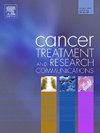The impact of PD-L1 expression status on the prognosis of ALK-positive lung cancer patients
Q3 Medicine
引用次数: 0
Abstract
Objective
This study analyzes the clinical characteristics of ALK-positive lung cancer patients and the impact of PD-L1 expression on their prognosis, providing insights for diagnosis and treatment.
Materials and methods
A total of 291 ALK-positive lung cancer patients, tested for PD-L1 expression at the First Affiliated Hospital of Soochow University between January 2019 and November 2021, were included. Clinical data and prognostic information were collected. Statistical analysis was conducted using SPSS 26.0 to explore the relationship between clinical features and prognosis.
Results
In ALK positive patients, the PD-L1 positivity rate was 59.8 %, with 19.2 % showing strong positivity. PD-L1 positive patients were predominantly male, over 55 years old, and presented more clinical symptoms, higher Ki-67 expression, larger tumor sizes, and more advanced disease stages. The progression-free survival (PFS) and overall survival (OS) were significantly lower in the ALK+PD-L1+ group compared to the ALK+PD-L1- group. Those receiving targeted therapy in stage IIIB-IVB non-squamous non-small cell lung cancer had significantly higher PFS and OS.
Conclusion
PD-L1 positivity is common in ALK-positive lung cancer patients and correlates with poorer prognosis. PD-L1 serves as an independent predictor of adverse outcomes, indicating its potential as a biomarker for assessing lung cancer severity and prognosis.
PD-L1表达状态对alk阳性肺癌患者预后的影响
目的分析alk阳性肺癌患者的临床特点及PD-L1表达对预后的影响,为诊断和治疗提供依据。材料与方法纳入2019年1月至2021年11月在苏州大学第一附属医院进行PD-L1表达检测的291例alk阳性肺癌患者。收集临床资料和预后信息。采用SPSS 26.0进行统计学分析,探讨临床特征与预后的关系。结果ALK阳性患者PD-L1阳性率为59.8% %,其中强阳性19.2% %。PD-L1阳性患者以男性为主,年龄55岁以上,临床症状较多,Ki-67表达较高,肿瘤大小较大,疾病分期较晚。与ALK+PD-L1-组相比,ALK+PD-L1+组的无进展生存期(PFS)和总生存期(OS)显著降低。接受靶向治疗的IIIB-IVB期非鳞状非小细胞肺癌患者PFS和OS均显著升高。结论pd - l1阳性在alk阳性肺癌患者中普遍存在,且与预后不良相关。PD-L1可作为不良预后的独立预测因子,表明其作为评估肺癌严重程度和预后的生物标志物的潜力。
本文章由计算机程序翻译,如有差异,请以英文原文为准。
求助全文
约1分钟内获得全文
求助全文
来源期刊

Cancer treatment and research communications
Medicine-Oncology
CiteScore
4.30
自引率
0.00%
发文量
148
审稿时长
56 days
期刊介绍:
Cancer Treatment and Research Communications is an international peer-reviewed publication dedicated to providing comprehensive basic, translational, and clinical oncology research. The journal is devoted to articles on detection, diagnosis, prevention, policy, and treatment of cancer and provides a global forum for the nurturing and development of future generations of oncology scientists. Cancer Treatment and Research Communications publishes comprehensive reviews and original studies describing various aspects of basic through clinical research of all tumor types. The journal also accepts clinical studies in oncology, with an emphasis on prospective early phase clinical trials. Specific areas of interest include basic, translational, and clinical research and mechanistic approaches; cancer biology; molecular carcinogenesis; genetics and genomics; stem cell and developmental biology; immunology; molecular and cellular oncology; systems biology; drug sensitivity and resistance; gene and antisense therapy; pathology, markers, and prognostic indicators; chemoprevention strategies; multimodality therapy; cancer policy; and integration of various approaches. Our mission is to be the premier source of relevant information through promoting excellence in research and facilitating the timely translation of that science to health care and clinical practice.
 求助内容:
求助内容: 应助结果提醒方式:
应助结果提醒方式:


